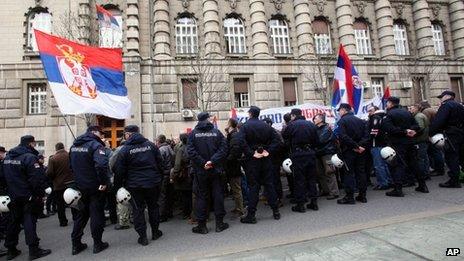Serbia rejects EU-brokered deal on Kosovo
- Published

Serbia has rejected a European Union-brokered deal on normalising ties with its breakaway province of Kosovo.
Kosovo unilaterally declared independence in 2008. While many countries recognise it as an independent country, Serbia does not.
The EU had given Serbia until Tuesday to relinquish its effective control over northern Kosovo in return for the start of EU membership talks.
Serbia must normalise relations with its neighbours before joining the EU.
Many minority ethnic Serbs in Kosovo reject the authority of the Kosovo government in Pristina.
'Regret'
Serbian Prime Minister Ivica Dacic told reporters: "The government of Serbia cannot accept principles verbally presented to its negotiating team in Brussels, since they do not guarantee full security and protection of human rights to the Serb people in Kosovo."
Last week, an eighth round of EU-mediated talks between Serbia and Kosovo broke up without a deal on normalising ties.
Catherine Ashton, the EU's top diplomat, said on Monday she regretted Serbia's rejection of the plan.
She said: "I believe that all the elements for an agreement on northern Kosovo are on the table. I regret the decision of the Serbian government to reject the proposals and call on them to make a last effort to reach an agreement, for the benefit of their people."
Serbia's Deputy Prime Minister Aleksandar Vucic called for more talks with rival ethnic Albanians leaders of Kosovo - even though Baroness Ashton said after last week's failed talks that the EU's mediation bid had ended.
"If there is a negative answer from [the EU], that would be bad news for Serbia, Kosovo and the EU," said Mr Vucic. "If that happens, we would have to start thinking of what to do next.
"We don't want Serbia isolated from the world, but we have to protect our interests. It is highly important that we reach an agreement."
Tension between Kosovo's ethnic Albanian majority and remaining ethnic Serbs has led to violence in recent years, notably around customs posts in northern Kosovo.
- Published8 April 2013
- Published28 June 2023
- Published28 November 2022
- Published10 September 2012
- Published1 March 2012